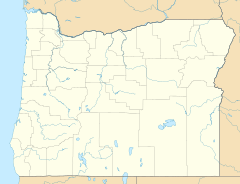Disston, Oregon facts for kids
Quick facts for kids
Disston, Oregon
|
|
|---|---|
| Country | United States |
| State | Oregon |
| County | Lane |
| Time zone | UTC-8 (Pacific (PST)) |
| • Summer (DST) | UTC-7 (PDT) |
| ZIP code |
97434
|
| Area code(s) | 458 and 541 |
Disston is a small, unincorporated community in Lane County, Oregon, in the United States. It's located southeast of Cottage Grove. This quiet spot is where Brice Creek and Layng Creek join to form the Row River. Disston is also about a mile west of the Umpqua National Forest.
Contents
A Glimpse into Disston's Past
Disston got its own post office in 1906. It served the community until 1974. The very first postmaster (the person in charge of the post office) was Cranston Jones. He was also one of the people who helped start the first sawmill in Disston.
How Disston Got Its Name
The town of Disston was named after the famous Disston saws. These were very well-known saws used for cutting wood. It makes sense, since sawmills were a big part of the town's history!
Sawmills and Logging
For many years, Disston was a busy town focused on sawmills and logging. Logging is the process of cutting down trees for wood. At one time, there were two big sawmills here:
- The Wheeler-Osgood Lumber Company
- The I. E. James Lumber Company
Both of these mills closed down in the 1950s.
A Supply Stop for Miners
Disston was also an important place for miners. It served as a supply point for those heading into the nearby Bohemia mining district. Miners would come here to get the tools and food they needed.
The Old Railway Line
The Oregon, Pacific and Eastern Railway had a logging railroad that ended in Disston. This railway was used to transport logs from the forests. Today, much of this old rail line has been turned into a fun path called the Row River National Recreation Trail. However, this trail doesn't quite reach Disston itself.
There's also a hiking trail managed by the United States Forest Service. It's called the Noonday Wagon Road Trail. This trail follows an old wagon road from 1896. People used this road to carry supplies into the mining district from Disston.
 | Roy Wilkins |
 | John Lewis |
 | Linda Carol Brown |



